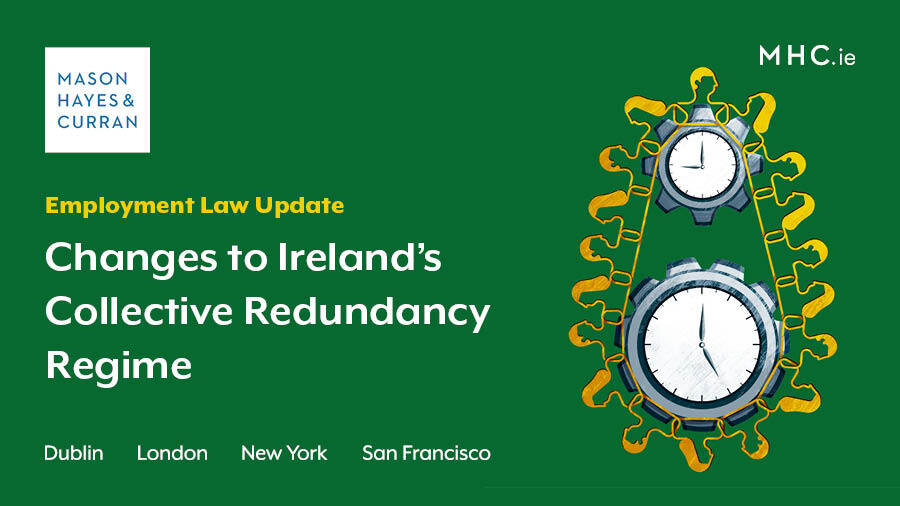Changes to Ireland’s Collective Redundancy Regime
Rights of employees and employers balanced?

The Irish Government has published the general scheme for the 'Plan of Action on Collective Redundancies following the introduction of the Insolvency Bill 2023'. Our Employment Law & Benefits team assesses the possible amendments and the likely impact on Irish employers.
The Irish Government recently approved priority drafting of the 'Plan of Action on Collective Redundancies following the introduction of the Insolvency Bill 2023'. Principally, the Bill will seek to add new protections for employees in a collective redundancy particularly, but not exclusively, where the collective redundancies result from an employer’s insolvency. The overall goal of the legislation is to enhance and add protections for employees and amend existing legislation, including the Protection of Employment Act 1977 and the Companies Act 2014.
Proposed Protection of Employment Act 1977 amendments
Following the publication of the general scheme on the plan of action for collective redundancies, several key points have emerged. These include:
- Liquidators will be required to go through the full information and consultation process with employees
- Where the collective redundancies arise because of the insolvency of an employer’s business, the Minister will have to be informed at least 30 days in advance of the first redundancy taking effect
- Liquidators may be prosecuted and fined for not complying with their obligations under the collective redundancy legislation
- A fine will be imposed on an employer who fails to enter initial consultations with employees ahead of collective redundancies and this fine shall not exceed €5,000, and
- Where employees are made redundant before the expiry of the 30 day period, they will be able to make a complaint to the Workplace Relations Commission
The primary objective of the new proposals will be the introduction of greater transparency in the collective redundancy process insofar as it relates to employees of insolvent businesses, and to provide an avenue of complaint by employees whose employers are not complying with their collective redundancy obligations.
Establishment of the Employment Law Review Group
The Government is also seeking to establish a statutory Employment Law Review Group which will advise the Minister on:
- The implementation of all employment and redundancy enactments
- Employment law legislative amendments
- Protection of employees in the redundancy process
- Recent employment law judgments
- European Union employment law developments, and
- Other queries or issues the Minister may wish to consider
The Government’s general scheme notes that the Review Group will seek to improve and maintain good workplace relations in the State and provide the Minister with general guidance on national and international matters of employment law.
Proposed amendments to the Companies Act 2014
In addition to the above developments, the Government has also proposed several amendments to the Companies Act 2014. This Act centrally governs the legal operation of companies in the State and the amendments are focused on enhancing the protections available to employees in a collective redundancy. The amendments will require:
- Directors of an insolvent company to notify employees of the presentation of a winding up petition “as soon as is practicable”
- A liquidator to provide information to employees on the winding up process, and
- The courts will be able to order a related company to contribute to the debts of an insolvent company
Conclusion
The Government has proposed several amendments to the Irish collective redundancy regime, particularly to the extent that it relates to employees of an insolvent business.
The establishment of an Employment Law Review Group, similar to the Company Law Review Group, is a welcome development and will enhance the Minister’s understanding and appreciation of recent legal developments. Ultimately, it is anticipated that the Employment Law Review Group will contribute to improved drafting of employment-based legislation and accordingly, the regime will be an improvement for all stakeholders.
For more information and expert advice on successfully navigating the new collective redundancies regime, contact a member of our Employment Law & Benefits team.
The content of this article is provided for information purposes only and does not constitute legal or other advice.
Share this:






